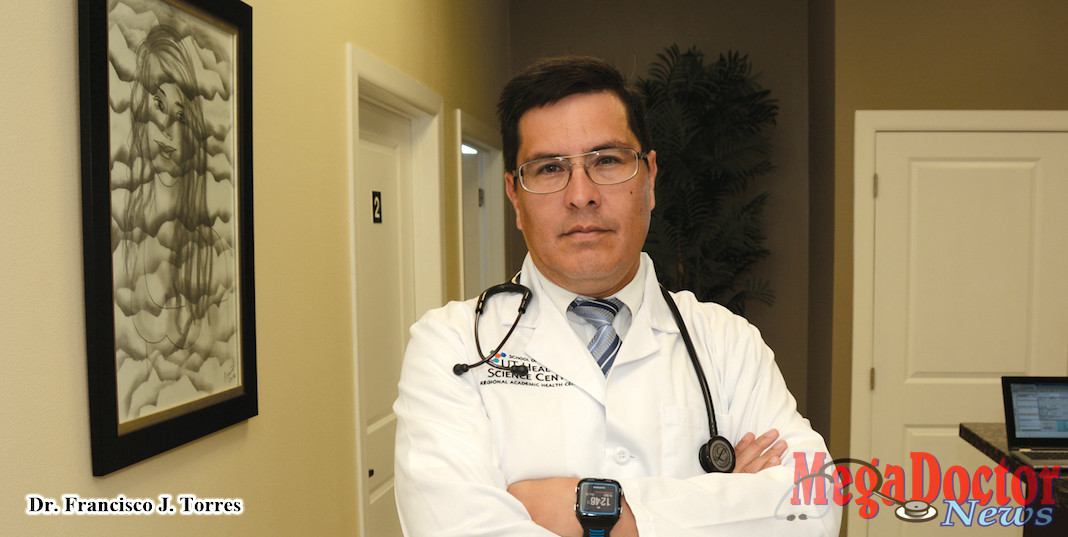By Roberto Hugo Gonzalez –
As originally published by Mega Doctor News newsprint edition December 2016.
About half a billion people in the world suffer from a mental disorder, from depression, post-traumatic stress disorder, and addictions, to name just a few. Unfortunately, many of these conditions sometimes go undetected, or if detected remain untreated, and that could end up in dangerous situations.
To add to this challenge, it is also important to note that psychiatrists are in big demand. In simple words, there is a critical shortage of psychiatrists and other mental clinicians in the United States. Another big problem is that as more people seek care, there isn’t the psychiatric workforce to meet the growing demand.
Mega Doctor News approached Dr. Francisco J. Torres; he is a psychiatrist in Brownsville, Texas. He owns and practices from JNC Behavioral Services. He is board certified in general psychiatry; including his years of training, he has already been practicing in the field of psychiatry for twelve years.
Dr. Torres is the Adolescent Psychiatry Associate Medical Director at Palms Behavioral Health located at 613 Victoria Lane in Harlingen, Texas; their phone number is 956-365-2600.
Currently, Dr. Torres provides psychopharmacology evaluations and follow-ups for patients in the Rio Grande Valley. “We are seeing kids, adolescents, adults, and geriatric patients with dementia or behavioral disturbances,” he told Mega Doctor News.
He also recognizes that psychiatric services are in high demand, especially because the Valley has a huge shortage of child psychiatrists. He said, “So, on this side, Cameron County, has difficult access to child psychiatry, so we are providing those services.” Dr. Torres pointed out that he has seen an increase in suicidal rates in teens and even in kids.
That is why that part of his services is evaluating cases, identifying situations where the patients are at high risk. At the same time, he is working to educate the community that depression hits hard on kids and adolescents. “We need to take necessary steps to prevent fatalities,” Dr. Torres stated.
He added that it might not mean necessarily to use medications. As a psychiatrist, he does the evaluations, and according to the outcome, the patient is referred to a psychotherapist. “We can identify risk factors, we educate the parents and try to work hand in hand with the schools. That’s part of what we’re doing now with the kids,” Dr. Torres told Mega Doctor News.
At least fifty percent of his practice is dedicated to the service of adolescents and children under twelve. Dr. Torres also said that he provides services to kids in foster care with Child Protective Services (CPS). “We also serve adults with cases that we call dual diagnosis, which means a substance abuse and mental illness.” He said that his practice makes the appropriate referrals, so patients receive the services they need.
Dr. Torres said that there is a high demand for rehabilitation and detox from substances. His evaluation of the patient is necessary, which later is referred to the appropriate settings.
“For the older folks,” he said. “Mostly what we see is neurocognitive disorders, what used to be called dementia, also, Alzheimer’s, Parkinson’s, frontal, and temporal dementias. Sometimes the families are not getting the services at the right time. The problem with that is that the older folks start to have cognitive decline, so by the time the families realize what is going on, it might be too late,” he said. One important aspect of memory decline is when it’s so obvious to family members, “it might be already irreversible,” Dr. Torres stated.
A great deal of his time and effort is spent trying to educate the patients about the importance of psychotherapy, because sometimes they want to have a quick fix. The importance of education about their illness and the importance of psychotherapy is paramount. “Patients need to know that it is important for them to work on themselves.”
Dr. Torres has a unique way of explaining how important it is. “I explain to them that it’s kind of like going to an emotional gym.”
He said that he works with a network of psychotherapists. “They’re excellent, and do help the patients gain insight into their condition. Sometimes patients don’t think that it is going to work, but we tell them to give it a try. Most of them realize how important it is.”
Another aspect of his technique is that they use small doses of medications, in these cases psychotropic medicines. He pointed out that patients feel very scared about the side effects of the psychiatric drugs. The model of the treatment, as per Dr. Torres, is to help them with small doses of medication.
The gap of symptoms they might have is covered through psychotherapy, exercise, and referrals to dieticians. “We try to modify the environmental stressors so they can start to improve. We instill in them the idea that this treatment is not one hundred percent based on medication. Medication is a component works in conjunction with about a year of psychotherapy treatment.”
Dr. Torres said that education is an integral part of his practice because patients often think that they can take medication a couple of months and come off the antidepressant. He said that Depression is the mental disorder that he most encounters.
He pointed out that, based on research done, an anti-depressant has to be taken for a whole year on the first episode of depression, and the clock starts to tick when the patient says ‘I’m doing better.’ He said, “At that point, we measure the symptoms, and if they have improved more than fifty percent of their symptoms, we consider that is a remission of the depression. At that point, we start to work one year.” The medication is tapered off, so patients don’t get the idea that they’re going to stay on the drugs for many years.
All these treatments require a psychiatrist that is entirely dedicated. He has an understanding of the hard work that they must put in to reach patients and help them.
Dr. Torres says it is important that his patients have a chance to come off the medications. He lets them know that there’s a percentage of relapse on their symptoms, and if that happens; he will act accordingly extending their time of treatment.
“That’s the challenge.” He said, “But when the patients understand they won’t be taking medications forever, they feel more enthusiastic about it, more motivated, and they make sure the plan will work.”
Dr. Torres explained to Mega Doctor News that there are circumstances and certain types of mental illnesses that require medication maybe for several years. In this case, he says, “We work with the patients on goals.”
Concerning the medications, he stated that during the treatment, if the situation calls for it, he changes medication to avoid side effects. “I always try to look for the least aggressive medication for them, and I share with them different scenarios regarding the medication.”
All patients are screened for their vital signs and asked specific questions. Some are very direct like; how are you sleeping? What energy level do you have? How is your appetite? How much activity do you have? Have you been feeling suicidal? Have you been feeling homicidal? Are you feeling very sad, angry, or hopeless? Has there been a traumatic event, loss of something, or death of a loved one?
The patient is informed how important these questions are. “That’s what they have to look for to understand if symptoms are getting better or worse. So, we’re teaching them how to track themselves on all these different parameters,” the doctor stated.
Dr. Torres was born in Brooklyn, New York to parents Francisco and Rosa Torres. He lived in the United States until he was eight years old and then moved with his parents to Colombia. He said, “My father is a businessman and my mother a housewife, but she also did some social work.” Currently, both parents live in Colombia.
He started his medical school in Colombia in South America and graduated in 1995. He did work as a general practitioner for five years, and then he came to the United States in 2000.
“I started my training in 2004 at Lincoln Hospital; that’s in the Bronx. It’s affiliated with Cornell University, and I trained for two years, between 2004 and 2006. Then I transferred to the VA Health Care System in Boston, Massachusetts affiliated with Harvard Medical School.” When he finished his training, he worked for several months at Bridgewater State Hospital, doing forensic psychiatry.
He also said, “During the time of my training, I did a postgraduate course in Clinical Neuroscience with Columbia University, and I also did a fellowship at Columbia University for Electroconvulsive Therapy (ECT) and Transcranial Magnetic Stimulation (TMS).
What brought you to The Valley? “I wanted to work in an underserved area because that’s where the need is.” He pointed out that Psychiatry is in high demand all around the world, and even though, here in the United States, there’s plenty of places, patients can’t even have access to a psychiatrist.
In 2009, when he came to the Valley, he started working with Valley Baptist Hospital for almost two years. In 2011, he opened his clinic, and when the clinic got bigger he moved to Brownsville, in 2013, and things kept expanding.
His services are in high demand, and now he has an adequate facility to treat his patients.
What inspired you to do what you do? “Part of it is I have an uncle, he’s a psychoanalyst. Ever since I was a teenager, we would have discussions about mental health, psychotherapy, and psychodynamics. I was fascinated by the chemistry of the brain, and human behaviors.” He continued, “I also had the opportunity to interact with research groups of Dr. Eric R. Kandel, the neuropsychiatrist, who received the 2000 Nobel Prize in Physiology/Medicine. I also met with Rodolfo Llinás, M.D. PhD., the head of neuroscience in New York University. There has always been a fascination with the neuroscience behind the behaviors. So, that inspired me, and I think that has been one of the best decisions I have ever made in my life. My gratification is in helping and making a difference in people’s lives.”
He noted that mental illness could be very devastating, even more devastating than cancer. He said, “It is people struggling with their body, not being able to endure themselves, and having this huge burden on their backs.”
Do you have any concerns about the future of your field of medicine? “The fundamental concern now is that the number of patients is growing, and there are not enough mental health providers.” Dr. Torres thinks it is important to be proactive on trying to help other primary doctors identify cases. Train them to do the initial management of the depression and anxiety, schizophrenia, and bipolar disorders until the patients get to see a psychiatrist.
“My clinic partners with the University of Texas Rio Grande Valley (UTRGV), and with the medical school in San Antonio.” He said, “I have medical students, nurse practitioners, and physician assistant students rotating in this clinic.”
His contribution to this group of trainees is to advise them that if they are interested in mental health, they need to put in a lot of effort on their clerkships. But if they’re not, he said, “They must put in a triple effort, because they’re going to end up seeing way more psychiatric patients than I will in my entire professional life.” He continued, “A lot of the first steps in treatment, would be determined by non-psychiatric providers.”
Dr. Torres is married to Lilia. “I met her right after I came out of Medical School during the time I was working in a little town in Colombia. We knew each other from the past, so when we met again, that was love at first sight,” Dr. Torres said. Lilia is the clinic’s office manager. As per Dr. Torres, her experience is in banking and finance.
Do you have plans for the immediate or long-term future? “We are planning an expansion; we’re going to be opening up a clinic in McAllen, around April/May of 2017.” At this time, you can call 956-545-0646 to set up an appointment at: JNC Behavioral Services located at 345 Lorenaly Drive in Brownsville.
Is there anything else that you want to add? “I want to tell all patients reading this newspaper, to keep in mind it is important to get an evaluation, especially for adolescents and kids.” He said, “Depression and suicidal risk is increasing in our young population, however, there is prevention for it.”
Dr. Francisco J. Torres has been selected as the Mega Doctor of this month because of his dedication to helping and making a difference in his patients’ lives. MDN




















